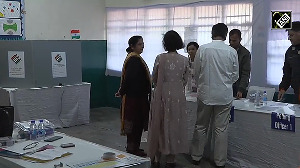Crime should be punished. This simple maxim becomes complicated when Indian politicians debate crime and punishment in Parliament.
It was a day of despair for those who attended Parliament on Wednesday to witness the debate on the Nanavati Commission report that probed the anti-Sikh riots of 1984.
The debate was full of clichés, expected political lies and weak defences.
The debate opened with the Speaker Somnath Chatterjee allowing Bharatiya Janata Party's Sushil Kumar Modi to move an adjournment motion.
But since politics is all about perception, the BJP 'graciously' allowed its ally Shiromani Akali Dal, the party that takes up the Sikh cause, to move the motion.
The Akali Dal's S S Dhindsa opened the debate with a restrained speech. He talked more about the past than the present and future.
He spoke of the sacrifices Sikhs made for the nation. How Mahatma Gandhi assured Sikhs that nothing will be done in independent India which will displease them.
"But we have got nothing. We haven't got our capital. We haven't got all the Punjabi-speaking villages. Our waters were taken away. We kept sacrificing things, but we never got justice. Please don't do this to Sikhs," Dhindsa said.
He said Indira Gandhi died at 9.20 am. At 11 am, All India Radio announced that two Sikhs bodyguards had assassinated her.
He questioned the wisdom of branding Sikhs in the news bulletin.
While giving details of how organised the riots were, he said that on the streets of Delhi, people came and pointed out shops belonging to Sikhs.
He described how a mob came in and broke the locks and how another bunch looted it while yet another set it on fire.
He said, "Sikhs haven't got justice from the Commission."
Dhindsa, to his credit, remained dignified considering the pathetic standard of Parliament etiquette and his party's past record of rabid communal politics. Everybody was surprised. Chatterjee praised him for showing restraint.
Next was Congress' Pawan Bansal. He was at his hypocritical best.
The Congress had two options. It could have remained humble and apologetic or adopted an aggressive stance in Parliament after taking action against those indicted in the report.
Bansal opened by saying that the incident was not a riot but a massacre. That it was a blot on the nation, which cannot be wished away. But after the customary routine of expressing sympathy, he put on record how Rajiv Gandhi and Sonia Gandhi showed tremendous respect for the Sikh community.
He said the Akalis were guilty of not helping the victims by helping them file proper first information reports.
The Sikhs did not get justice because of the improper FIRs, he said. He said that in each FIR, 100 or more accused were named.
He said, without much emotion, "When the matter goes to courts, the government can't do much. If under the law of the land you can't punish somebody, who can be blamed?
"Commissions give their views and findings. The government has to depend on these findings. Can you punish anybody on the basis of probability?"
And just before he finished his speech, the Congressman in him came out.
He said, "The Congress considers the Sikh community very much their own. The Akali Dal has no right to say that they are the flag-bearers for Sikhs. They are the root cause of the problem."
Taking a dig at the BJP, an ally of the Akali Dal, Bansal asked, "Who fanned Hindu fundamentalism after 1984?"
He asked the BJP why the courts did not help Sikh victims during the six years it was in power.
"I don't want to say this, but why don't you (Sikhs) think that even though you are minority, the prime minister is a Sikh."
He did not forget to mention Army Chief J J Singh too.
As though these two men in high offices were there not on merit but by virtue of being Sikhs!
The Congress has indeed lost its moral compass.
He concluded that the Congress is in power in Punjab with help of Sikh votes, implying that the voters have forgiven them.
If Bansal was narrow in his approach, then L K Advani was downright political.
Throughout the debate, every time Advani and others from the BJP stood up to speak, the Congress benches shouted, "What about Modi and Gujarat riots?"
Advani said the incidents should not be called riots as no one community was pitted against Sikhs in 1984.
Vasudeo Acharya, Left leader intervened and dismissed this contention.
He said even the Gujarat riots were anti-Muslim and not Hindu-Muslims riots.
Then Advani went on to quote from a report in a newly-launched Mumbai daily where P G Gavai, the then Lt Governor of Delhi, said if he had spoken out, a big Congress leader would have been killed.
The Speaker objected to Advani quoting from a newspaper. He said any statement made in the media was not admissible in the debate.
Advani said he had spoken to Gawai and verified his statement.
But the Speaker was not convinced. Advani said both commissions (the Justice Mishra Commission, which had probed the riots earlier and the Justice Nanavati Commission) said that the army was called in late. He wanted the government to find out who organised the riots. But it was an unconvincing appeal.
The Left was no better. When, for instance, Communist leader Mohmmad Salim spoke it looked like the Left had already cut a deal with the Congress. He said the Left supported the Congress. This after virtually forcing the Congress to reject the Action Taken Report, almost securing Minister of State for Non-Resident Indian Affairs Jagdish Tytler's resignation (Tytler resigned a few hours after the debate) and asking the government to announce new rehabilitation promises.
This obviously seems to be the golden period for the Left.
All the Left leaders condemned the ATR, the delay in justice and in the same breadth condemned the BJP for what happened in Gujarat and voted against motion.
If this was how the three major parties behaved, Sukhbir Singh Badal, the son of Prakash Singh Badal was a shame!
He behaved as though he had absolute monopoly on the Sikh issue. When the Speaker reminded him that his time was up, he said, "Shameful."
Chatterjee got so angry that he stood up and asked Badal, "Who is shameful? Shameful for what?"
Badal said, "You don't allow me to speak on an issue that concerns my community."
Only when prodded by his elder colleagues, did he apologise.
Next was BJP's Sushil Modi. He had come prepared.
He said the nation agreed on three things. That the Congress was involved in the riots, that the police did nothing to save the Sikhs and that the government delayed calling the army. He said, "How can we forget that in Amethi, there was graffiti all over the place that read 'Beti hai sardar ki, beti hai gaddar ki'. Who whipped up this hatred against Sikhs?"
Modi also quoted Railway Minister Lalu Prasad Yadav's speech after the Bhagalpur riots where he said, 'The Congress has engineered most of the riots in country.'
He also pointed out that Justice Mishra, who gave a clean chit to the Congress just six months after the riots, was later nominated to the Rajya Sabha by the Congress.
Kapil Sibal came out with the bizarre claim that cases were filed against BJP and Rashtriya Swayamsevak Sangh workers in 1984 in some police stations.
Nobody took it seriously. He read out the passages where Nanavati absolved Rajiv Gandhi.
Sibal, one of the most successful lawyers in the country, did not speak on how the judicial system failed to deliver justice to Sikhs.
He defended Tytler and said that evidence against him had cropped up only after 18 years. He furnished the details of the Gujarat riots cases and asked the BJP to investigate those cases.
After all of these speakers came the prime minister.
The most important thing, he said, was not to drive a wedge between the Sikh community and the national mainstream.
He said while the Akali Dal could criticise the Congress party in this era of 'competitive politics', it would be a sin against 'our nation if you sow seeds of discontent among Sikh youths'.
The prime minister emphasised that nothing should be said or done which would result in the ugly face of terrorism resurfacing in Punjab.
Recalling the days of Partition, he said the Sikhs suffered the most. "That trauma still haunts me," he said.
Dr Manmohan Singh's was, by far, the most sober speech.






 © 2025
© 2025